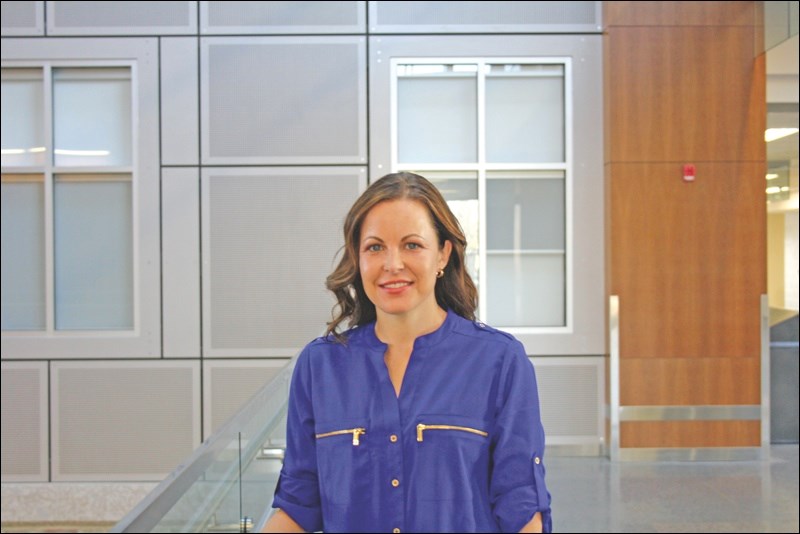As a little girl growing up in Flin Flon, Holly Mansell certainly wasn’t afraid of bugs.
In fact she would gather up insects, fossils, shells, rocks – pretty much any collectable nature had to offer.
“My best friend used to call me ‘nature woman,’” recalls Mansell. “When I was in Grade 2 I received my best Christmas present ever, a microscope, which allowed me to study even smaller things, such as cells and bacteria.”
She seemed destined for a career in science. And in a roundabout way, that’s exactly where she has
ended up.
Just 37, Mansell – Dr. Mansell, that is – is an assistant professor at the University of Saskatchewan’s College of Pharmacy and Nutrition.
The position involves intense research in the fascinatingly intricate area of human organ transplantation and the role of medications therein.
“Solid organ transplantation is a pretty complex area of medicine,” Mansell says. “You have to give patients anti-rejection medications to prevent them from rejecting their new organ, and patients have to take these medications for life. It is a bit of a balancing act. The medications require continual monitoring and can cause many side effects.”
Mansell is undertaking research projects examining those medications.
“If patients are unable to take their medications as prescribed, it can lead to organ rejection and potentially death,” she says. “I have a number of projects on the go investigating ways that we can improve medication adherence in this population, including producing a video series for patients on the kidney transplant waitlist. We plan to eventually test the effectiveness of this.”
In addition to her research duties, Mansell lectures and provides one-on-one mentorship to mostly third- and fourth-year pharmacy students.
She also spends one day a week working as a clinical pharmacist at the Saskatchewan Transplant Program, which facilitates organ and tissue donation and transplantation in the province.
“As a clinical pharmacist I help manage the immunosuppressant medications and all of the complications that go along with them,” Mansell says.
The mother of two is the first to admit she did not take a traditional path to her current career.
Growing up, she was a curious and active youth. She taught piano lessons throughout high school and spent summers working for the City of Flin Flon’s Summer in the Parks children’s program and, later, HBM&S (now Hudbay).
Mansell thought of becoming a scientist or astronaut, but when it came time to settle on a career, she chose to become a pharmacist.
“It seemed practical,” she recalls. “It was a science degree, which aligned with my interest in science and health care, and there was a fairly high demand for pharmacists.”
After graduating from the University of Saskatchewan, Mansell and husband Kerry (also a pharmacist from the Flin Flon area) moved to Seattle, Washington, to work as community pharmacists at Safeway.
While there, they enrolled in the Doctorate of Pharmacy program at the University of Washington. Mansell wasn’t sure what she wanted to do with her doctorate but sensed it would benefit her down the road.
A few years later, doctorates in hand, Mansell and her husband moved back to Canada. She started work as a hospital pharmacist for the Saskatoon Health Region while he began teaching at the University of Saskatchewan.
Working as a hospital pharmacist in the areas of critical care and renal transplants, Mansell was inspired to apply for a job as a transplant pharmacist at the Saskatchewan Transplant Program.
She was hired, helping care for kidney, liver, lung and heart transplant recipients.
“I loved working in this area but eventually moved again to the university to work in the position I am in now, mostly to pursue my interest in research,” Mansell says.
Having advanced so far at a relatively young age, Mansell attributes her success to three things: working hard, taking opportunities as they come and good timing.
“Students often ask me how they can end up where I am and I tell them to work hard, but be patient, treating every experience as a learning opportunity,” she says. “I would never have had the opportunity for this type of job straight out of university, nor would I have been ready for it. In the meantime, position yourself appropriately by obtaining the right experience and education so you are ready when the opportunity presents.
“Also, don’t be afraid to veer out of your comfort zone. I have changed jobs on average every three years, and every time it has been intimidating and a steep learning curve. All of these experiences added up, though, to get me where I am now.”




